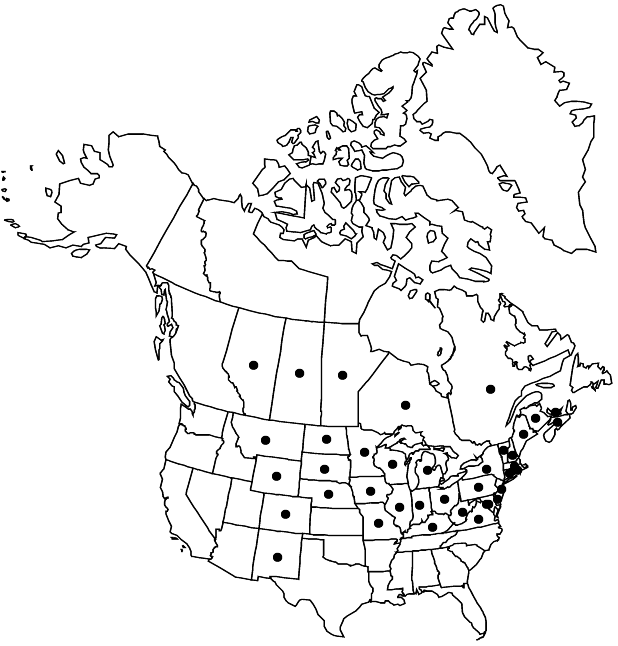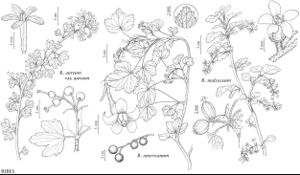Ribes americanum
Gard. Dict. ed. 8, Ribes no. 4. 1768,.
Plants 0.5–1.5 m. Stems erect to spreading, crisply puberulent to villous, glandular throughout with yellow, shiny, sessile, crystalline, round glands; spines at nodes absent; prickles on internodes absent. Leaves: petiole 1–7 cm, (equaling or shorter than blade), crisply puberulent to villous, with slender processes along proximal margins; blade pentangular, 3–5-lobed, cleft nearly 1/2 to midrib, (1.5–)2–7 cm, base broadly truncate to shallowly cordate, surfaces with amber, sessile glands, thickly villous at least abaxially or along abaxial veins, lobes broadly deltate, margins usually coarsely bicrenate-serrate, apex acute to bluntly acute. Inflorescences spreading to pendent, 6–15-flowered racemes, 1.5–5 cm, axis pubescent, flowers evenly spaced. Pedicels jointed, 0.1–2 mm, villous; bracts narrowly lanceolate, to 10 mm, villous to sparsely hairy. Flowers: hypanthium green, broadly tubular-campanulate, 3–4.5 mm, glabrous or sparsely villosulous; sepals not overlapping, usually reflexed, cream to greenish white, narrowly oblong-spatulate to nearly oblong, 4.5–5 mm; petals connivent, erect, whitish, oblong to oblong-obovate, not conspicuously revolute or inrolled, 2.5–3 mm; nectary disc not prominent; stamens nearly as long as petals; filaments expanded at base, 1 mm, glabrous; anthers cream, oval, 1 mm, apex with small-holed callus; ovary glabrous; styles connate nearly to stigmas, 6–8 mm, glabrous. Berries palatable when cooked, black, ovoid, 10 mm, glabrous, without resinous glands.
Phenology: Flowering Apr–Jun.
Habitat: Swamps, stream banks, wet meadows, fens, moist ravines and canyons, open woods
Elevation: 50-1700 m
Distribution

Alta., Man., N.B., N.S., Ont., P.E.I., Que., Sask., Colo., Conn., Del., D.C., Ill., Ind., Iowa, Ky., Maine, Md., Mass., Mich., Minn., Mo., Mont., Nebr., N.H., N.J., N.Mex., N.Y., N.Dak., Ohio, Pa., R.I., S.Dak., Vt., Va., W.Va., Wis., Wyo., introduced in Asia (n China).
Discussion
Fresh material of Ribes americanum does not have the skunklike odor of R. hudsonianum and R. nigrum. The bracts are much longer than the jointed pedicels. The leaves and bracts bear fimbriate processes on the proximal margins that may be remnants of adnate stipules.
Selected References
None.
